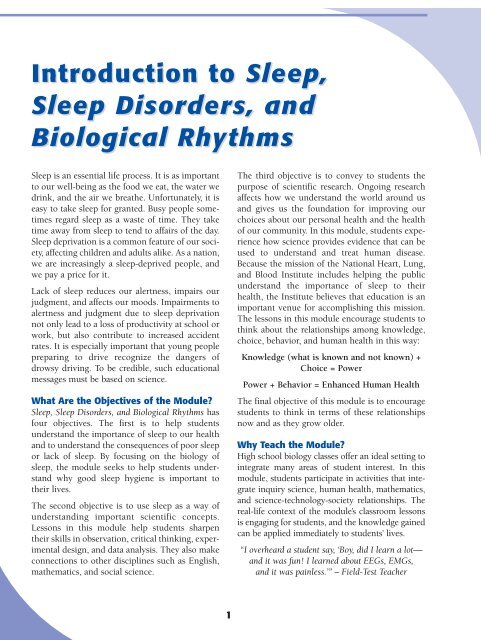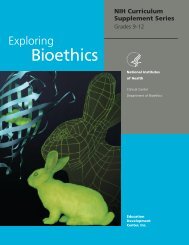Biological - NIH Office of Science Education - National Institutes of ...
Biological - NIH Office of Science Education - National Institutes of ...
Biological - NIH Office of Science Education - National Institutes of ...
You also want an ePaper? Increase the reach of your titles
YUMPU automatically turns print PDFs into web optimized ePapers that Google loves.
Introduction to Sleep,<br />
Sleep Disorders, and<br />
<strong>Biological</strong> Rhythms<br />
Sleep is an essential life process. It is as important<br />
to our well-being as the food we eat, the water we<br />
drink, and the air we breathe. Unfortunately, it is<br />
easy to take sleep for granted. Busy people sometimes<br />
regard sleep as a waste <strong>of</strong> time. They take<br />
time away from sleep to tend to affairs <strong>of</strong> the day.<br />
Sleep deprivation is a common feature <strong>of</strong> our society,<br />
affecting children and adults alike. As a nation,<br />
we are increasingly a sleep-deprived people, and<br />
we pay a price for it.<br />
Lack <strong>of</strong> sleep reduces our alertness, impairs our<br />
judgment, and affects our moods. Impairments to<br />
alertness and judgment due to sleep deprivation<br />
not only lead to a loss <strong>of</strong> productivity at school or<br />
work, but also contribute to increased accident<br />
rates. It is especially important that young people<br />
preparing to drive recognize the dangers <strong>of</strong><br />
drowsy driving. To be credible, such educational<br />
messages must be based on science.<br />
What Are the Objectives <strong>of</strong> the Module?<br />
Sleep, Sleep Disorders, and <strong>Biological</strong> Rhythms has<br />
four objectives. The first is to help students<br />
understand the importance <strong>of</strong> sleep to our health<br />
and to understand the consequences <strong>of</strong> poor sleep<br />
or lack <strong>of</strong> sleep. By focusing on the biology <strong>of</strong><br />
sleep, the module seeks to help students understand<br />
why good sleep hygiene is important to<br />
their lives.<br />
The second objective is to use sleep as a way <strong>of</strong><br />
understanding important scientific concepts.<br />
Lessons in this module help students sharpen<br />
their skills in observation, critical thinking, experimental<br />
design, and data analysis. They also make<br />
connections to other disciplines such as English,<br />
mathematics, and social science.<br />
The third objective is to convey to students the<br />
purpose <strong>of</strong> scientific research. Ongoing research<br />
affects how we understand the world around us<br />
and gives us the foundation for improving our<br />
choices about our personal health and the health<br />
<strong>of</strong> our community. In this module, students experience<br />
how science provides evidence that can be<br />
used to understand and treat human disease.<br />
Because the mission <strong>of</strong> the <strong>National</strong> Heart, Lung,<br />
and Blood Institute includes helping the public<br />
understand the importance <strong>of</strong> sleep to their<br />
health, the Institute believes that education is an<br />
important venue for accomplishing this mission.<br />
The lessons in this module encourage students to<br />
think about the relationships among knowledge,<br />
choice, behavior, and human health in this way:<br />
Knowledge (what is known and not known) +<br />
Choice = Power<br />
Power + Behavior = Enhanced Human Health<br />
The final objective <strong>of</strong> this module is to encourage<br />
students to think in terms <strong>of</strong> these relationships<br />
now and as they grow older.<br />
Why Teach the Module?<br />
High school biology classes <strong>of</strong>fer an ideal setting to<br />
integrate many areas <strong>of</strong> student interest. In this<br />
module, students participate in activities that integrate<br />
inquiry science, human health, mathematics,<br />
and science-technology-society relationships. The<br />
real-life context <strong>of</strong> the module’s classroom lessons<br />
is engaging for students, and the knowledge gained<br />
can be applied immediately to students’ lives.<br />
“I overheard a student say, ‘Boy, did I learn a lot—<br />
and it was fun! I learned about EEGs, EMGs,<br />
and it was painless.’” – Field-Test Teacher<br />
1

















